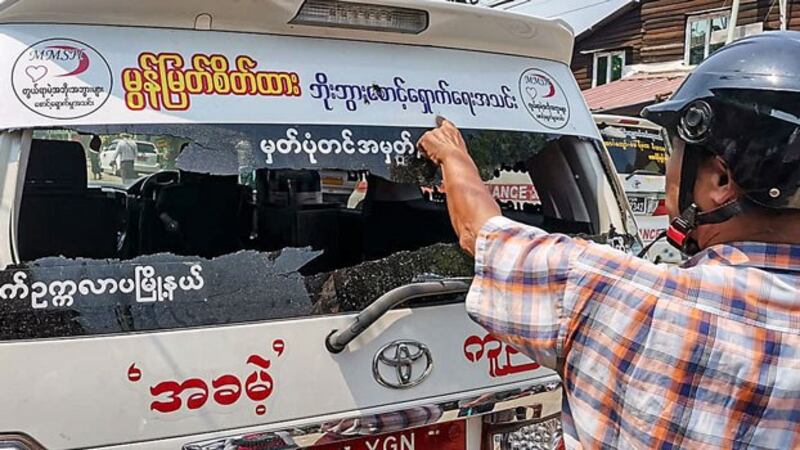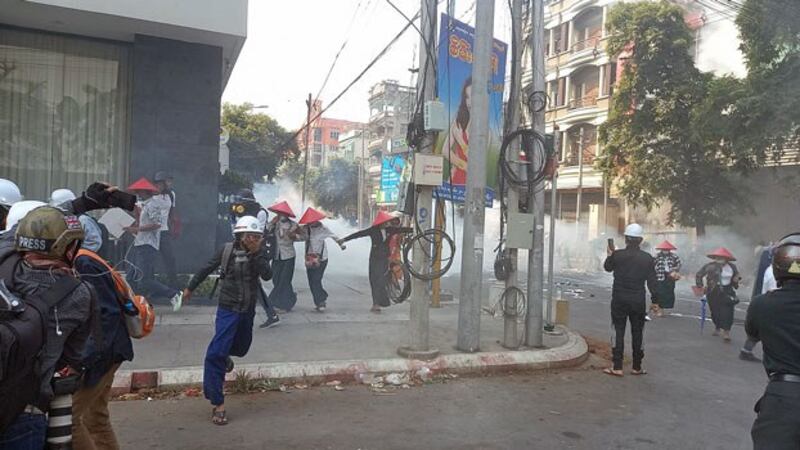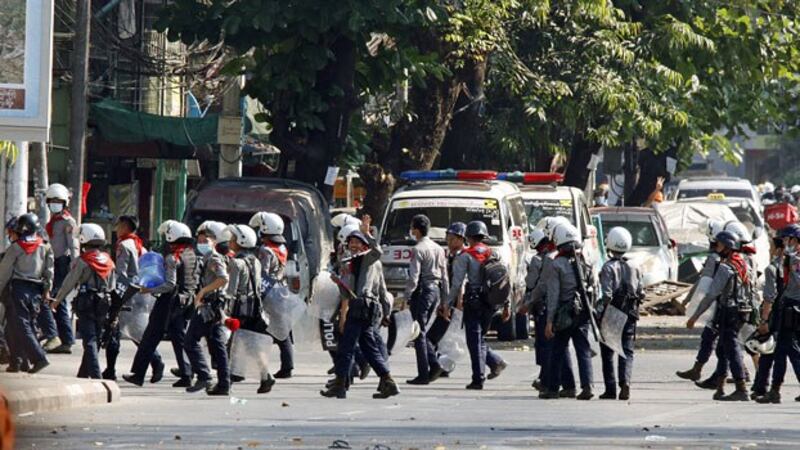Myanmar citizens say they are furious and concerned over the increased use of violence against urban residents and drivers by the Myanmar junta’s police and military forces, fearing that the lawlessness has created life-threatening situations.
Security forces are breaking down doors, ransacking homes, shooting into alleyways, and spraying tear gas into apartments in an effort to find and arrest people participating in the anti-junta protests that have rocked the country since Feb. 1 when the military seized control of the democratically elected government.
Locals also report incidents in which night watchmen in residential areas have been shot by police from police vehicles. Many have raised questions about people dressed in civilian clothes who accompany police and soldiers and beat up protesters.
Residents complain that gunfire is now regularly heard in several cities and towns across Myanmar. They also say that security forces smash the windows of parked cars without reason and use excessive force with protesters, bystanders, and locals alike.
Ma Mon of Thamine Myothit, Mayangone township, in northern Yangon said residents never expected police and soldiers to enter small alleyways in their neighborhood.
“They fired 14 or 15 shots in the air before entering,” she said about a recent incident. “For those who live on the ground floors, the gunfire was so loud and scary. And there were no protests going on during that time. They just want to threaten and frighten the residents.”
Another Mayangone township resident, Ma Thinzar, complained of security forces vandalizing parked cars.
“I didn't see them right in the act, but when I turned around, I saw that the rear windows and the side windows of two or three cars had been broken,” she said. “The cars were not in the middle of the road; they were parked by the roadside.”

‘Violations of the law’
A High Court attorney who did not want to be identified for safety reasons said police stopped the son of one of his friends as he was driving home and dragged the young man out of his vehicle. Police later opened a case against him under Section 505 of the Penal Code, a statute with vaguely worded incitement violations that carries up to two years in prison.
“I saw a similar incident at Myae Ni Gone [junction in Yangon] where police pulled a man out of his car,” said the attorney. “I don’t know what has happened to him.”
“These are illegitimate acts,” he added. “Stopping cars and dragging off people are violations of the law, but we cannot stop them or do anything about these lawless acts.”
In Kyaikkami, a town situated on a peninsula about 48 kilometers (30 miles) south of Mawlamyine, the capital of Mon state, about 50 policemen stopped in restaurants and tea shops and arrested people who had photos and videos of recent protests on their mobile phones, local residents said.
Mandalay residents also report being stopped and harassed by police for apparently no reason while driving.
One resident of Myanmar’s second-largest city reported that police and soldiers stopped her while she was riding on her motorbike on the road leading to Mandalay Hill, which was blocked by barbed-wire barricades.
“There were over a dozen policemen in riot gear together with three or four soldiers,” she said. “They stopped my motorbike and asked me where I was going and searched our bags.”
One of them asked the woman to turn her cell phone on, though he did not look through its contents, and then handed it back to her.
“Maybe because I tried to be very polite to them,” she said.
Some of the arrests in Mandalay look like kidnapping cases, and people have been asked to pay money for their release, residents said.
“There have been incidents where arrested people have been asked for money,” said an attorney from the city, though he was not sure whether it was the police or prison officials who were responsible.
“Some people were asked for 200,000 kyats [U.S. $140], and 50,000 kyats of the amount was said to be for the broker who negotiated the deal,” he said.

‘We had to make a firm decision’
The lawless atmosphere and brazen actions of security forces continue to compel more civil servants to join the civil disobedience movement (CDM) accompanying widespread anti-junta protests.
Thousands of civil servants from 11 departments at the Ministry of Electricity and Energy have left their jobs and joined the movement as of March 1, according to a statement by the employees sent to RFA.
The document indicates that some of the more than 4,000 workers have submitted several leave requests to join the campaign since Feb. 8.
Bankers, engineers, doctors, university students, schoolteachers, and government employees from other sectors have refused to go to work since Feb. 1 and have hit the streets to demonstrate alongside other protesters. The labor stoppage across public and private sectors has disrupted some of society’s most critical functions.
“A lot of employees from some departments under the ministry have joined the movement since Feb. 8 by taking leave and not going to work,” said an employee from the Electricity and Energy Ministry who verified the information in the statement, but did not want to be identified for safety reasons.
“But now, as of Mar. 1, all employees of the Ministry of Electricity and Energy in Naypyidaw have joined the civil disobedience movement,” he said.
“More and more people are dying in the protests, and we had to make a firm decision [whether or not to join],” he added.
If top ministry officials pressure the striking employees to return to work, the workers will report it to the Committee Representing Pyidaungsu Hluttaw (CRPH), a national legislative body led by National League for Democracy legislators elected in the 2020 elections, the statement said.
The CRPH has said that striking civil servants will be able to go back to their jobs when the elected civilian government returns to power.
When contacted by RFA, a senior official at the ministry said he had no authority to comment on the issue.

'I will do my part'
RFA reported Tuesday that the junta government suspended a dozen tax and revenue workers under the Ministry of Planning, Finance and Industry for joining the CDM on Feb. 26.
The 12 civil servants — customs inspectors, deputy custom inspectors, and accountants — were suspended for failing to perform their duties, said one of the affected workers.
“I will continue to take part in the movement, [and] I will do my part from any position so that the elected leaders regain state power and we have a government elected by the people,” the suspended deputy customs official told RFA.
The office of the Pyithu Hluttaw, or lower house of Myanmar’s national parliament, announced Monday that it had suspended 17 employees, including senior officers, who had joined the CDM.
Myint Oo, a lawmaker who represents the Thanatpin township constituency in Bago region, said that the civil disobedience campaign eventually will pay off.
“We have elected Hluttaw [parliament] members, and we are forming our own government with these elected leaders,” he said. “We have the support of governments and organizations from across the world, and the entire population is supporting us. We are sure we will achieve success sooner or later.”
On Wednesday, six policemen from the Tatkone police station in the capital Naypyidaw wrote on their social media accounts that had resigned because they no longer wanted to serve under the military junta.
Reported by RFA’s Myanmar Service. Translated by Khin Maung Nyane. Written in English by Roseanne Gerin.
